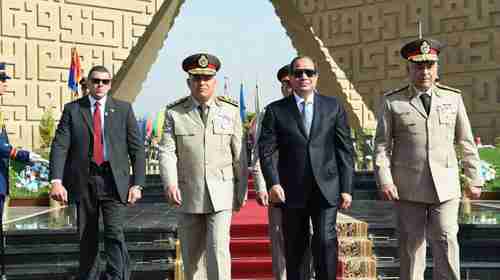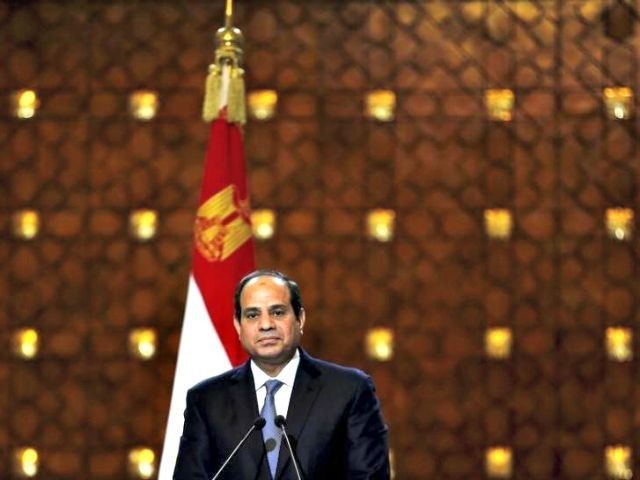This morning’s key headlines from GenerationalDynamics.com
- Egypt arrests journalists in cafes and homes ahead of Monday protests
- Egypt’s al-Sisi warns of ‘chaos’ in Monday’s Sinai Liberation Day protests
- Sudan and Tunisia prepare for simultaneous protests in solidarity
Egypt arrests journalists in cafes and homes ahead of Monday protests

Abdel al-Fattah al-Sisi with military guard
With large protests expected in Cairo on Monday, Egypt’s government is conducting a security crackdown. At least 47 arrest warrants have been issued since Thursday, and dozens of citizens have been arrested without notice from cafes and private residences. Security forces threatened the families of people who were not at home at the time of the attempted arrest.
The crackdowns are targeting bloggers and journalists who have been critical of the government of president Abdel al-Fattah al-Sisi, especially the recent agreement with Saudi Arabia that gave up two Red Sea islands in exchange for $22 billion in investments.
Those who are arrested are facing charges of inciting illegal protests, affiliation with a banned organization, attempting to overthrow the regime, promoting false news and information aimed at disturbing public order. Some are accused of “threatening to use violence against the president of the republic while he is acting within his constitutional authorities.” Daily News Egypt and AP
Egypt’s al-Sisi warns of ‘chaos’ in Monday’s Sinai Liberation Day protests
Some of the largest protests in years, reminiscent of the protests that brought down Egyptian dictator Hosni Mubarak in 2011, are expected on Monday, the anniversary of Sinai Liberation Day, referring to the “liberation” of Sinai from Israel.
Egypt’s president Abdel al-Fattah al-Sisi is warning of “chaos” and “destabilization attempts” over the planned demonstrations and protests planned for Monday by opposition political parties and movements. In a nationally televised speech, al-Sisi said:
I see there are people calling once again for damage to [Egypt’s] security and stability. Our responsibility is to protect security and stability, and I promise Egyptians that no one will terrorize them again.
Still there are evil powers that aim to destabilize stability and safety inside Egypt. Over the last three years, we have succeeded in establishing state institutions, such as the parliament, constitution and presidency. The survival of these institutions means the survival of Egypt. […]
Security services… will confront with extreme rigor any attempt to disturb public order.
Al-Sisi is deploying hundreds of troops to maintain peace, and is warning that a repeat of large past protests will be punished.
Monday is Sinai Liberation Day, commemorating April 25, 1982, when all Israeli forces were withdrawn from the Sinai Peninsula, and the land was returned to Egyptian control.
The call for protests was triggered by a historical coincidence. Egypt and Saudi Arabia recently signed a deal to build a bridge over the Red Sea connecting the two countries, and there have already been a day of protests on April 15. ( “16-Apr-16 World View — Egypt-Saudi deal for Red Sea bridge triggers massive protests in Cairo”)
The deal called for Saudi Arabia to invest $22 billion development projects in Egypt. The deal also called for Egypt to give two disputed Red Sea islands, the Sanafir and Tiran islands, to Saudi Arabia. The coincidence of giving up sovereignty in the two islands just days before the celebration of regaining sovereignty from Israel of the Sinai Peninsula triggered a nationalist fury in many Egyptians.
A petition titled “Egypt is not for sale,” which calls for a reversal of the decision on the islands and supports the protests, was signed by more than 300 Egyptian novelists, lawyers and activists. However, the anger of the protesters goes far beyond the loss of the two islands. After the 2011 Arab Awakening, Egyptians had hoped and prayed that a new government would not only bring stability to the country, but would also improve human rights, end abuses by security forces, and end government corruption.
None of these hopes has been realized. The number of jihadist terrorist attacks has been increasing, security forces are as brutal and abusive as ever, and protesters say that government corruption is as bad as ever.
With some activists promoting violence, and with the security forces prepared to respond to violence with violence, it’s possible that the protests could spiral out of control and even put al-Sisi’s presidency in danger. Al Ahram (Cairo) and Egyptian Streets and AP
Sudan and Tunisia prepare for simultaneous protests in solidarity
Tunisian activists have called for protests in front of the Egyptian Embassy in Tunis on Monday, in solidarity with the protests planned for Cairo. According to the statement, “We reject the arrests carried out recently by President Abdel Fattah Al-Sisi against the Egyptian people in an attempt to thwart the 25 April movement organized by a group of revolutionary forces in Egypt.”
Since Egypt has just given two islands to Saudi Arabia, Sudan is hoping that Egypt will concede in another border dispute. The Halayeb and Shalateen Triangle is part of the shared border between Egypt and Sudan. Egypt says that the 8,000 square mile region has fallen within Egypt’s borders since 1820, when Muhammad Ali, the Ottoman ruler of Egypt, put Sudan under his political authority. On the other hand, Sudan says that an 1899 agreement between the two countries grants the region to Sudan. But Egypt points out that a 1909 joint Egyptian-Sudanese map puts the territory inside Egypt. But Sudan points out that Sudan had sovereign control over the region from 1899 to 1958, a period during which Sudan governed the area uninterrupted and without objection.
There have been threats of war over the disputed region, but both sides say that they hope to resolve the dispute through peaceful negotiations. Daily News Egypt and Anadolu (Ankara)
KEYS: Generational Dynamics, Egypt, Abdel al-Fattah al-Sisi, Saudi Arabia, Sinai Liberation Day, Israel, Red Sea, Sanafir and Tiran islands, Tunisia, Sudan, Halayeb and Shalateen Triangle, Muhammad Ali
Permanent web link to this article
Receive daily World View columns by e-mail

COMMENTS
Please let us know if you're having issues with commenting.